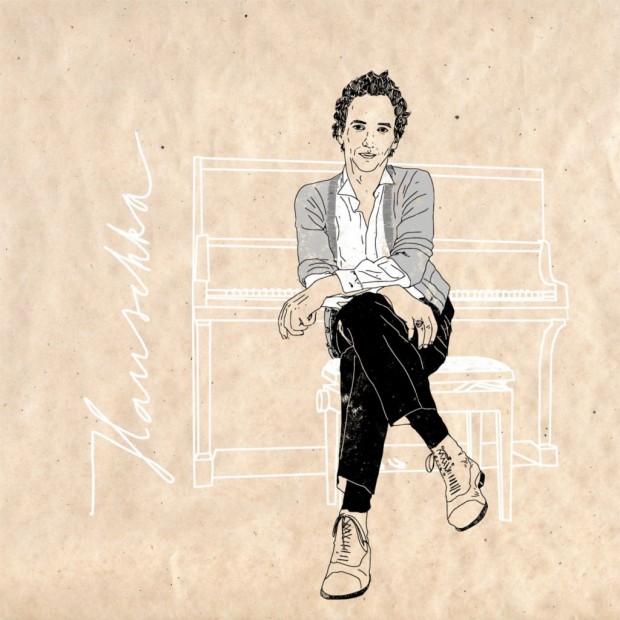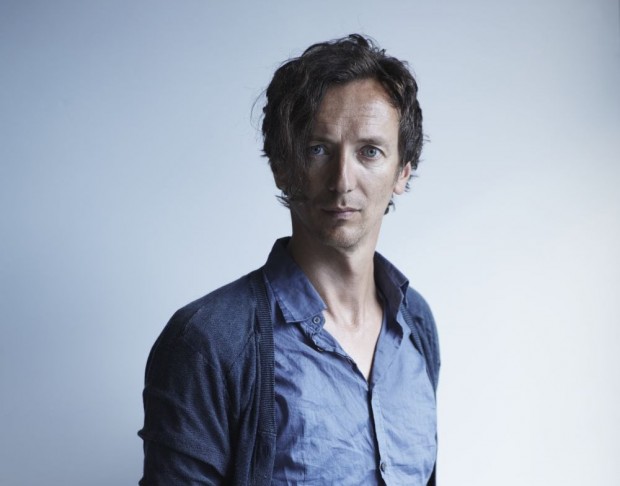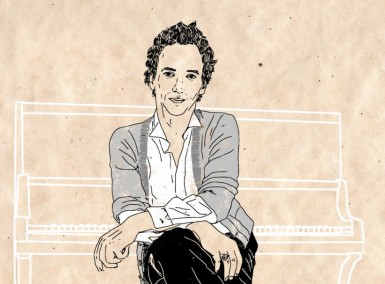
Illustration by Stefan Ibrahim
At least with his latest album Abandoned City, which is already a masterpiece in the so called genre of contemporary classic, HAUSCHKA is on everyone’s lips. With a bunch of releases on labels like FatCat Records, and its sub label 130701, he already earned plenty of attention in broader circles, reaching from the lovers of playful and romantic indie pop to the conservative defenders of a strict and solid classical framework. With his background in classical piano studies, as well as sideways in pop and hip hop he knows and loves both and is far away from subordinating himself into patterns, scenes or genres. This is perfectly shown in the different venues he played the last years. Bertelmann plays and enjoys all types, small and dark basement clubs but also big concert houses with seating.
At the very moment of NOTHING BUT HOPE AND PASSION‘s interview, the composer has just finished the first rehearsal for the big opening concert of the Leipziger Jazztage (Leipzig Jazz Festival) that he will play together with the MDR Symphonic Orchestra and so we meet directly at the rehearsal room. As one of the most popular jazz festivals, with a focus on contemporary jazz music, the festival couldn’t have found a better artist to introduce its 38th edition. The uniqueness of this evening consists as well in the realization of HAUSCHKA‘s music with a big orchestra, so there is a special sense of excitement in the air.
The frame for this outstanding collaboration is the MDR’s invitation of Bertelmann as artist in residence, and so I meet him on the first day in his new so called residency, Leipzig. It’s an established concept, that an institution, an opera house, a museum or a studio invites an artist to grant him residence and mainly artistic freedom to produce, perform or express his kind of artistic output in a novel environment with the opportunity to get in touch with a new room, new people, shortly said a new surrounding in general.
How would you describe this partnership with the orchestra, especially for the jazz festival’s opening concert?
‘It will open up the opportunity to work via different, focused spots with the body of sound, the orchestra, and mainly with help of its conductor Kristian Järvi. An acquaintance connected us and we started to talk about a possible collaboration and noticed really fast that we understood each other very well. I usually don’t like that kind of crossover conceptions, because most of those attempts to combine different worlds of sound or art in general, which were made in the past became quite constrained and tensed. In our case it is something completely different, since the aim isn’t to subordinate my own identity but to bring it forward.
Of course there are times when your identity isn’t popular or simply not needed or wanted. As you can see in the case of so many composers, at all times, who had a difficult time lifelong and suddenly, after death, they earned posthumous fame. So I am really happy to run a chance because it’s a perspective for me. Besides September the 11th I will have two more dates, one in January and one in July. And even if we spoke just about three concerts, there will be a lot of work to do, because each one will be a completely new concept. For which you have to write the notes, arrange all the other parts.’

Photo by Mareike Foecking
We start discussing an orchestra’s special characteristic, its special sound and habit. Bertelmann tells how it feels and to what extent he as the composer, is able to control that bigger body of sound, as he calls it. He shows a deeply rooted connection to his work, especially to his instrument but describes his workflow clearly and transparent, even to me as an amateur in the matter of classic music.
What makes it special to work with this orchestra?
‘Oh, in the broadest sense I’m an amateur as well in case of working with or conducting an orchestra. Also the comprehension and authority over such a machinery is something that I’m not able to handle in a way, the conductor does. Sure I can hear the special sound of an orchestra, but especially with the performance of my own pieces, I have to try. I have played with smaller ensembles in America, they differed totally in sound and dynamic, some of them played more lyrically, others were thoroughly influenced by composers like PHILIP GLASS or STEVE REICH and had a very rhythm applied, minimalistic sense of playing. In the USA string players for example play a broader range. In next to no time they play in an indie band like ARCADE FIRE, that’s part of their normal schooling to play such music and the differences of playing those types of music are much smaller than here.’
How was today’s first rehearsal?
‘Well, I heard my pieces played by this orchestra for the first time, while I previously had that all just in mind or programmed via MIDI on a computer. One piece that will be premiered during this performance is based on a version that I wrote for a string quartet with a solo for the viola. But I implemented that one for the orchestra, because I like to approach slowly to this bigger unit of the orchestra, since I understand it as a body of sound. To me it isn’t inevitably the implementation of a band based composition into an orchestral work but sometimes it’s simply one sound that is produced by all the instruments at one time, like a collage. It’s like giving subtle nuances to a colour, something you usually do with filters on a synthesizer.’
So we can imagine this like parameters on a synthesizer?
‘Yes, to me it feels like this. Parameters that are formed in my mind, brought to paper, read by the instrumentalist, processed through his personal ‘filters’ and finally outputted. And that’s the point where the conductor creates a big amount of the quality and texture of the output. Because of his naturally evolved relationship to the orchestra and his perfect knowledge of that body of sound he’s able to sharpen the single elements, correct and edit their attendance like no one else. At the end of the day this is a remix.’
This slowly changing of parameters of an instrument, is a way of producing Bertelmann also follows when composing his very own version of classic music on a prepared piano. Shown in the 1940s by JOHN CAGE, the idea isn’t new, but was continuously developed and personalized by him. Bertelmann’s preparations contain everything, from table tennis balls and crown caps to duct tape and tin foil. But why use a fully analogue and nearly non repeatable way of sound editing in times of perfect digital sound processing tools and all that stuff?
It’s like the difference between an automatic and a manual gear box. I love the fact that I can change a sound by hand, literally. Everything is in front of me; even if it’s just one single instrument that I play, I have an infinite use of means. And it works in every room with a piano, without electricity or any digital processing. Just some simple modifications and suddenly a keystroke looses a number of tones or becomes a broken beat. These are my special claims of the unique haptic of my preparations and the small amount of time I need to modify or change.
Even when described as a more or less classical composer, HAUSCHKA‘s workflow still contains flexibility and let’s say some ‘random moments.’ Next to the different sound settings, given by the venues he plays, he mentions: ‘I have a standard set of preparations, that I know and like to work with, because I really love the sound of special preparations on a special place in the piano, but until I sit behind the instrument, I’m able to change everything of my plan. And in nearly every case I do so.’
Talking to Bertelmann about his very own way of writing and performing music, it becomes evident he is a special artist who found his own peace in producing his very own art. Finally, asked for his feelings about the special occasion of his concert he goes into raptures and shows honest happiness and true thankfulness for being warmly welcomed by the people who invited him.
It really looks like I was invited, because they want to see me playing.
—



